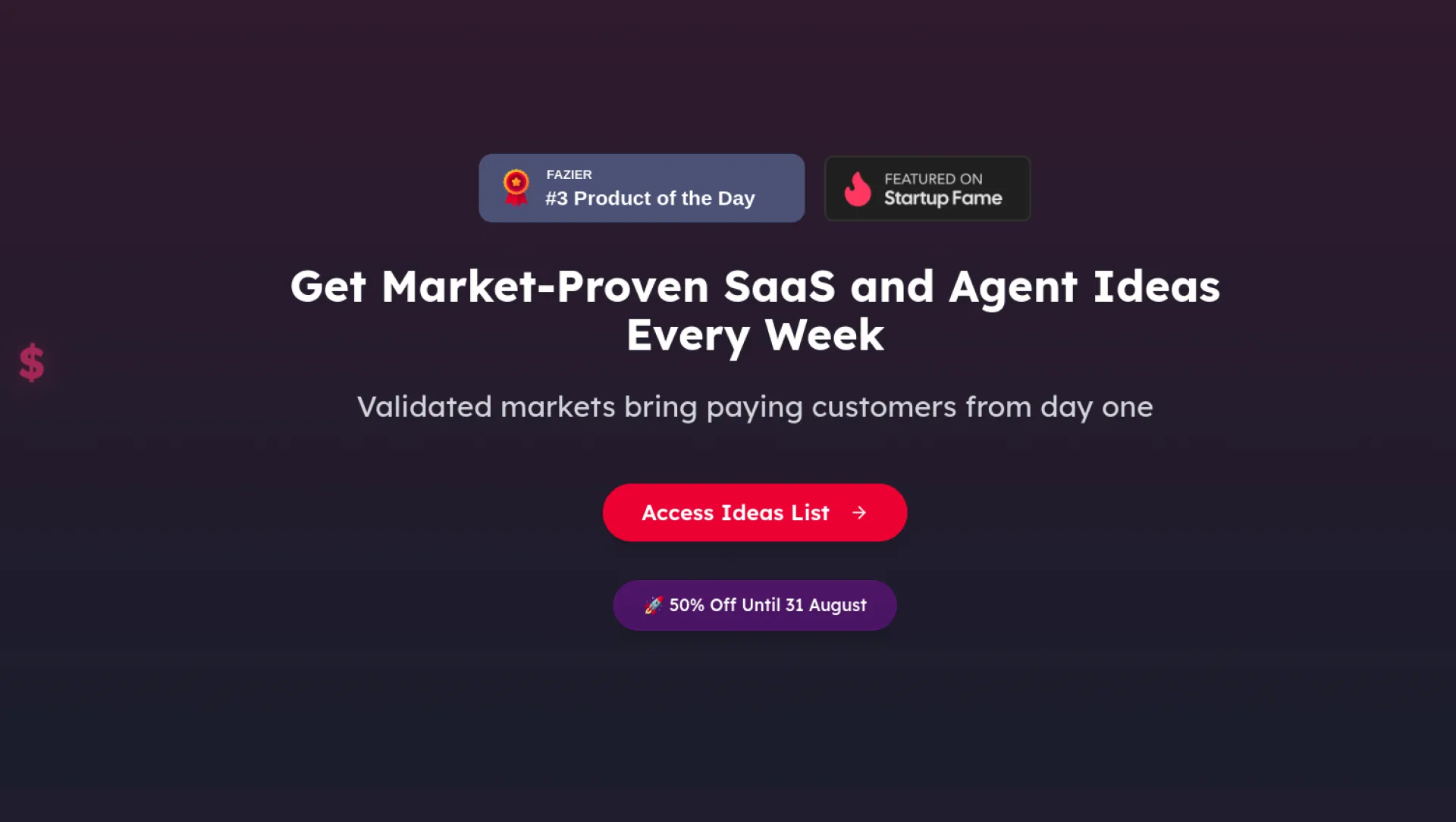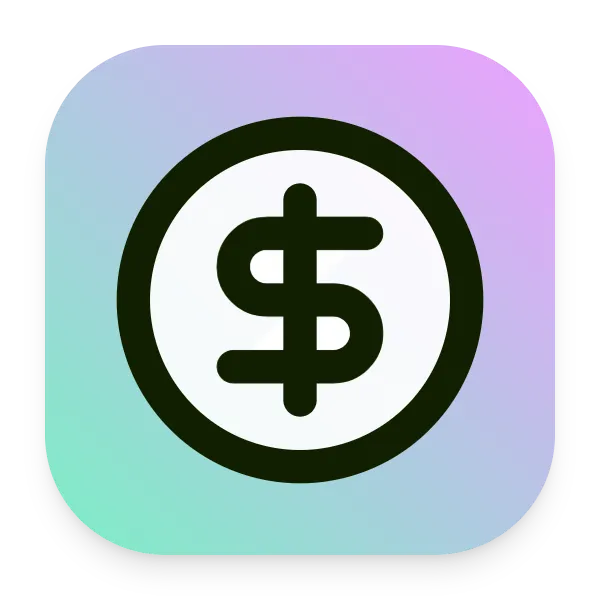Install Huzzler App
Install our app for a better experience and quick access to Huzzler.

🍎 improve ranking on AI search → lm-seo.com 💎 personalized content generation → authenticposts.com 💵 get market proven saas ideas every week → validatedsaas.com >> helping founders build and scale → zerotocustomers.com
Sanket Kogekar's Products
Posts
(i've literally seen it across all founders that i worked with)
- lack of product demand. being first to market is often a wrong idea; targeting a non-existent niche is a critical mistake.
- building features without speaking with customers.
- not enough focus on sales. sales should begin from the day the mvp is ready.
- not building good relationships with employees. leading by fear alienates talented employees who have options.
- promising equity but not putting it on paper makes employees hesitant to stay.
- building with an exit strategy in mind, especially revolving around a single big business acquisition, is risky.
- hiring interns rarely makes sense for ambitious startups.
- following the hype instead of focusing on monetization.
- raising capital too fast, often before achieving traction or product-market fit (pmf).
- focusing on unnecessary work at an early stage, such as adding analytics or excessive features.
- not being fast enough: long meetings, unnecessary travel, excessive days off, inefficient capital allocation, wrong hires, etc.
- founder-market fit isn’t mandatory but accelerates progress significantly when present.
- using buzzwords in startup features instead of providing clear value.
- not iterating enough based on user feedback.
- not discussing numbers (user retention rate, churn rate, revenue, profits, capital allocation, etc.) regularly
- failing to track essential kpis like ltv (lifetime value) and cac (customer acquisition cost).
- not being transparent about pricing on the landing page; making customers click ‘request demo’ can deter them.
- burning capital too quickly without considering the runway.
- overspending on marketing, product development, or hiring without a clear roi plan.
PS. not sure what to build next or how to grow it? I can help you get there without burning time or cash via ZeroToCustomers .com - find all kinds of help you need over there as a founder.
- picked a problem i had myself: wasting weeks building stuff no one paid for
- no landing page at first. just a pinned tweet and a public google sheet. shared early wins. that helped way more than a pretty site
- posted weekly on x about real results. ugly screenshots, revenue numbers, what i’d build if i had no job. no filters, no fluff
- kept product updates dead simple: sheet link + telegram access. didn't overbuild. focused only on speed + clarity
- most of the growth came from 3 things:
- x (twitter): showing receipts, not ideas
- indie hacker comment sections: leaving value, not links
- niche telegram groups: not pitching, just helping
- reddit: used throwaway accounts to ask "what would you build if you lost your job today?" and answered my own questions with mini-case studies. these got saved a lot, which helped visibility
- built a lead magnet that didn’t suck: gave away 10 validated ideas for free, full breakdown. no email needed. people shared it
- x (twitter) growth trick: added “$15k/mrr” and “validated saas ideas weekly” in my name. helped people find me when they searched for “saas” or “mrr”
- faked urgency without lying: “50% off till end of month” worked better than i expected. people wait for a reason to buy
- used posts as validation: if an idea i shared got comments or dms, i flagged it for possible product expansion
- never used ads, never emailed cold, never begged influencers. just made it easy for people to see value in 5 seconds
- kept price low enough to feel obvious but high enough to not attract freebie hunters. $79 once → worth it to anyone serious
if you’re a solo founder: pick a problem you live. post the journey in public. make the product simple enough to explain in a tweet. don’t stop for 90 days.
validatedsaas.com still grows weekly. all organic. no bs.

How i run a lean saas in 2025 without losing my mind:
- i don’t do paid ads, cold dms, or chase trends. i let distribution work for me. here's how
- added a public roadmap with feature requests via jotform + notion. users like voting on what matters. gives them a reason to share with others too
- i built SEO pages that don’t feel like SEO pages. used simple questions as page titles like "how do i solve x without doing y". wrote answers like a human, not a blogger
- then i post those q&a answers in reddit comments, indiehackers, and quora. no links. just useful answers. people google the question and land on my page anyway
- embedded chat on every page (via typedream’s chat widget) with one question: "what’s missing here?" got free feedback and content ideas daily
- joined 2 niche slack communities with actual builders. didn’t pitch anything. just posted updates of what i was working on. people asked to try it
- i automated onboarding emails using buttondown and kept them super short. no HTML. just "here’s what most users do next" and a link
- every month i post revenue breakdowns even if it sucks. transparency builds followers. followers turn into users. users bring more users
- when i feel burnt out, i just ship smaller features. i don't grind harder. momentum beats scale
- people underestimate how much you can grow by just being consistent and useful for 12 months straight. that’s it. no viral hack. just not quitting
if you're solo in 2025, your biggest edge is not trying to look big. just be real, show work, and ship stuff that works
PS. building something good? if you want honest feedback that actually helps, i'm here. ZeroToCustomers.com - get all kinds of help you need to get traction and scale faster.
(for solo founders who actually care)
- stop writing for "keywords" like it's 2015. instead, write for 'questions people ask inside communities'. i search reddit and slack threads and answer them better than anyone else. that's it.
- use tools like alsoasked .com and detailed .com to find what’s missing in top pages. don’t copy. find the gaps. google ranks “fresh angles” now because ai spam is drowning search.
- write in plain english. kill the structure. stop writing like a robot. the more your stuff sounds like how people talk, the more google trusts it’s real.
- give actual data or firsthand experiences. i once ranked a 300-word answer that just walked through what i did with screenshots. no intro, no outro. just value.
- every page should have one job. not five. pick a single intent and go deep. google is rewarding this because ai content usually tries to cover everything surface-level.
- write fast, publish faster. i treat content like testing startup ideas. if it doesn’t get impressions in 3 weeks, i kill or rework it. no point clinging to dead pages.
- don’t waste time chasing backlinks from random blogs. write content that actually helps people, drop it in places where people are already asking, and let it spread naturally.
- bonus trick: google your competitor + “pdf” or “filetype:pdf” and you’ll find docs they’ve written and hidden. i use these to find keywords and copy structures that already work.
this works. it’s what i do. no fluff, no outreach, no ads.
just show up where people look for answers and be better than the lazy ai spam clogging up the feed.
PS. I help founders rank higher on AI search. Get AI SEO report for your site at LM-SEO.com if you are trying to improve your ranking.

- most people treat their mvp like a product. it's not. it's a test.
- if you're building before validating demand, you're guessing. and guessing adds 3-6 months of wasted time minimum
- mvp doesn't mean "code something fast" - it means "test an offer with real users fast"
Here's what actually works in 2025 if you're a solo founder:
- skip landing pages unless you already have traffic. instead, use a pinned tweet or a google form. quicker. easier to iterate.
- don't touch no-code tools until you've had at least 20 convos or email replies from people saying "i want this now"
- use reddit search + search operators like: site:reddit .com "looking for [your solution]" - that's free customer research
- steal phrases from reddit comments or amazon reviews and use them in your offer copy. it converts better than anything you’ll write
- build your waitlist manually. dm everyone who liked your idea post. not with "buy now" spam - ask what problem they actually have
- treat x (twitter) like a search engine. post your mvp concept + what you’re testing. people will tell you what’s broken in minutes
- post daily. not to go viral. but to gather signal. what hits? what flops? you're not building a product, you're refining a problem.
bonus tip: search your mvp idea on tiktok comments. tons of people explain exactly what they want in plain language. steal that.
Raw truth: no one cares what you're building. they care if it solves something that already bothers them.
validate the problem. validate the willingness to pay. then build.
PS. I give honest feedback about your product/idea so you don’t waste time, money, or effort - get any kind of help you need at ZeroToCustomers .com

- Don’t track everything. just track these 3:
- how many indexed pages you’ve got (google search console → pages → filter by “indexed”)
- clicks & impressions from ai answers (google search console → performance → filter “search appearance” for ai overviews)
- which urls get traffic from non-branded keywords (click performance → filter out your brand name)
- use gsc console bulk export (go to settings → turn on bigquery export)
- now you get daily data without clicking 20 tabs like a robot
- Want ai results? use raw text. no fluff, no fancy visuals
- ai overviews in search pull clean, direct answers
- they don’t care about pretty formatting, just the info
- if you write, write like you're explaining something in discord. clear and blunt.
- use a site:yourdomain .com search every 2 weeks
- google hides your pages when it wants. this tells you what’s actually showing up
- Want distribution without blog posts or video? post short value drops on reddit, twitter, hacker news
- link to your tool, landing, or how-to page
- this still gets indexed + picked up by ai overviews
- avoid self-promo vibe. just be helpful and blunt
- hot trick: set alerts using visualping dot io for ai answers on your main keywords
- it checks if your site is showing up in ai overview boxes
- not 100% reliable but better than sitting around guessing
- If you're using a static site (like with framer, webflow, or custom build), check log files
- look for googlebot visits on new urls
- if no visit in 7 days, something’s wrong with your internal linking
- don’t waste time on rank tracking tools. they lie half the time. use real traffic and query data.
- remember: AI seo isn't about ranking #1 anymore. it’s about getting cited in ai answers. that’s the game now.
do less. measure what matters. keep the loop small.
PS. want your site to rank on llms like perplexity, chatgpt, and grok? grab a free ai seo report at LM-SEO.com

publishing blogs makes zero sense for b2b startups.
all business dudes use ai for information.
unless you got unique insight which is very very valuable, please don't bother with blogs.
create free tools instead.
ps: try lm-seo .com if you want to start ranking higher on chatgpt and other llms.
- i picked one problem i could solve well. no fancy niche, just something real. i made a landing page that looked clean and answered 3 things fast: what it is, who it’s for, and why it’s different.
- posted a plain text breakdown of it on linkedin + twitter. not "here’s my startup", but "here’s the problem, here’s what i built, here’s what i learned". no links in the post. just told the story. link in first comment.
- reused that same story but tweaked it for indie hackers, a relevant subreddit, and a few slack groups. didn’t copy-paste. rewrote it like i was talking directly to each group.
- picked 5 active discussions every week in places my users hang out. didn’t pitch. just dropped value, shared parts of what i learned while building, then naturally linked to it if it made sense. built trust first.
- every new lead that signed up? i checked where they came from and what pages they looked at. if 10 people came from a reddit post, i doubled down on that subreddit and posted again 2 weeks later with an update. same energy.
- made a searchable faq-style public doc with answers to questions users asked me over dm or email. google indexed it. now random long-tail queries are sending organic traffic.
- seo note: i didn’t chase big keywords. i targeted weirdly specific phrases people actually google when they’re desperate. example: “how to sell a chrome extension without a website”. that kind of stuff.
- this all takes consistency, not money. i spent 30 min a day max. some posts flopped. some blew up. but it stacks up. and 2 months later, leads still trickle in daily.
no secrets. just showing up in the right places with something useful and not sounding like a tool.
PS. founders waste months chasing irrelevant metrics. I help focus on what truly matters at ZeroToCustomers.com

- i only build stuff i can grow without cold dms or paid ads. if i can't get users by just posting online, it's dead to me.
- i watch what small creators or indie devs complain about in public. not big accounts. the smaller ones show real pain. check replies on x and producthunt comments.
- i hang out in niche reddit subs and discord servers, but i don’t post. i just watch what annoys people. pain is better than feature requests.
- i don’t look at what vcs are funding. i look at what solopreneurs are using to get unfair advantages. most are quiet about their stack. i pay attention to weird tool mentions on podcasts and small newsletters.
- i write fake landing pages and share them without saying it's mine. if people ask "where can i try this" or "is this real?" i keep going. if it dies, i kill the idea.
- if i can’t think of a clear distribution channel on day 1, i drop the idea. not "i’ll figure it out later". examples: growing via search (seo), x threads, indiehacker posts, webflow template sites, niche telegram groups.
- i search for keywords with low volume but high buying intent. like “free notion generator” or “convert csv to json tool”. you don’t need traffic. you need intent. most ideas don’t die from no users, they die from wrong users.
- the idea must feel like cheating. if it doesn’t feel like i’m giving someone an unfair shortcut, i won’t build it.
- i stalk appsumo, gumroad, f5hub, and newsletter directories for products that got 100+ upvotes/comments but no decent execution. it shows there’s interest, just bad delivery.
- if the first version can’t be built with 1 api and 1 nocode tool, i won’t start. speed > scope. get it out fast and ugly.
- if i can answer the question "who will share this without me asking them to?" i know i’m close.
- people don’t pay for “tools”. they pay to skip work or feel in control. i ask myself: does this idea do either?
that’s how i filter 100 ideas into 1 that doesn’t suck.
PS. I post recent SaaS and AI agent ideas making good money at ValidatedSaaS.com so you can skip the waitlists or validation phase, and get paying customers from day one.

- google oauth is a must, 90% of users prefer it.
- skip free trials, charge from day one.
- market shamelessly, talk about your product everywhere.
- respect unsubscribers, their feedback is gold.
- post-launch = 80% marketing, 20% tweaks.
- use your own saas, spot and fix bugs firsthand.
- engage users, email, text, and talk to them often.
- consume quality content, read books, watch documentaries.
- think bigger, don't settle for $10k/month when $100k is possible.
- detach from ideas, if it doesn’t make money, move on.
- landing page = apple quality, sleek, modern, and polished.
- mvp = core features only, follow the moscow framework.
- retention drives revenue, 70% comes from existing users. reduce churn.
- price on value, not competition.
- brand matters - logo, responsiveness, good language.




